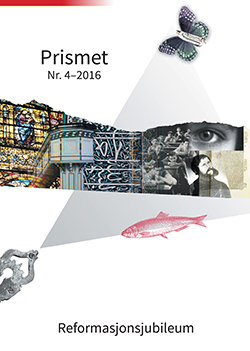Sentrum og snikksnakk. Luther i bruk - i samfunn og skole
DOI:
https://doi.org/10.5617/pri.4477Sammendrag
Approaching the 500-year Reformation anniversary, the article discusses what might legitimize Luther as a topic in today’s society and educational practice. Are his crucial ideas an exclusively religious heritage, or could they be converted to issues of common relevance? Referring to the ways Luther was used by the GDR state and church in the 1983 anniversary, the article questions the potential for recontextualizing his specifically theological issues. By this, it relates to a current debate in religion didactics whether stories could be taught according to their religiously specific or universal, existential dimensions – cf. the question of learning about or from religion. The cultural and political impact of Luther’s theology obviously makes it relevant as common heritage. His theological issue, however – man’s lack of free will (De servo arbitrio), and his view on «theological man» as defined solely by God’s justification (De homine), which Luther considers to be his primary concern – appears to be counter-intuitive, i.e. different from what seems right or natural. Hence, it challenges the concept of cultural heritage, but proves a critical corrective to common, essentialist justifications of human dignity, cultural identity and superiority – which makes it an issue to be learnt from and not only about.
Emneord: Luther, reformasjonen, kulturarv, fagdidaktikk, religionsdidaktikk.
Nedlastinger
Utgave
Seksjon
Lisens
Innhold publisert i utgaver av tidsskriftet Prismet utgitt før 2017 er beskyttet av Lov om opphavsrett til åndsverk (https://lovdata.no/dokument/NL/lov/1961-05-12-2). Dette betyr at tekst og bilder publisert i disse årgangene av tidsskriftet kun kan deles og re publiseres med skriftlig tillatelse fra forfatter og/eller fotograf.
Fra og med årgang 2017 er innhold i tidsskriftet Prismet - dersom ikke annet er uttrykt - lisensiert gjennom Creative Commons Lisens BY-NC-4.0 (https://creativecommons.org/licenses/by-nc/4.0/). Dette betyr at innhold kan kopieres, distribueres og spres i hvilket som helst medium eller format, så lenge disse vilkårene er fulgt:
Kreditering: Du må oppgi korrekt kreditering, oppgi en lenke til lisensen, og indikere om endringer er blitt gjort. Du kan gjøre dette på enhver rimelig måte, men uten at det kan forstås slik at lisensgiver bifaller deg eller din bruk av verket.
Ikke-kommersiell bruk: Du kan ikke benytte materialet til kommersielle formål.
NB: Creative Commons-lisensen gir deg ikke nødvendigvis alle de tillatelser som er nødvendig for din tiltenkte bruk. For eksempel kan andre rettigheter, som reklame-, personvern-, eller ideelle rettigheter, sette begrensninger på hvordan du kan bruke materialet.
Forfattere som publiserer i Prismet aksepterer følgende vilkår:
Forfatter(ne) beholder opphavsretten til artikkelen og gir Prismet rett til første publisering, samtidig som artikkelen blir lisensiert under Creative Commons Lisens BY-NC-4.0. Denne lisensen tillater deling av artikkelen for ikke-kommersielle formål, så lenge forfatteren og første publiseringssted Prismet krediteres.
Forfatteren står fritt til å publisere og distribuere arbeidet/artikkelen etter publikasjon i Prismet, så lenge det henvises til tidsskriftet som første publiseringssted. Innsendte bidrag som er antatt for publikasjon eller som er til vurdering i Prismet kan ikke samtidig være under vurdering for publikasjon i andre tidsskrifter, antologier, monografier eller lignende. Ved å sende inn bidrag aksepterer forfatteren at bidraget publiseres både digitalt og i trykt utgave av Prismet.



